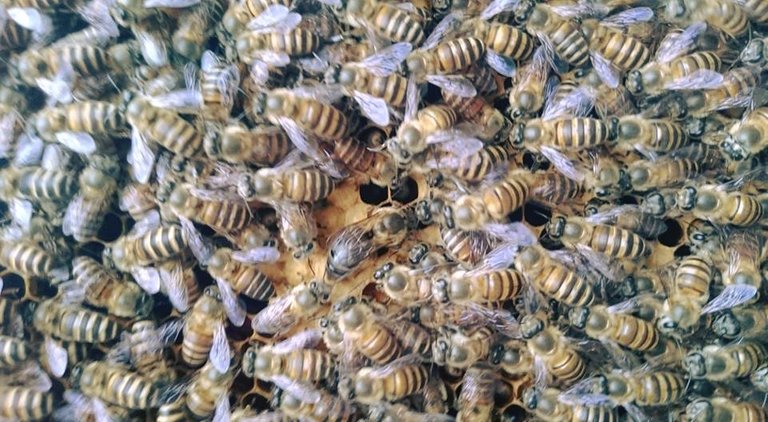
Honeybees is one of the most productive and efficient social insects, capable of harvesting and processing huge volumes of raw materials and converting them into food, materials for habitat construction. Their ability to coordinate and identify nectar and pollen source across vast terrains enable them to produce honey and carry out vital pollination works crucial to human agriculture.
Contrary to popular beliefs the queen bee, whilst extremely important to colony, does not have direct control over the worker bees in most of the decision-making processes. All communications are done instinctively as a hive collective through pheromones that permeates throughout the hive or by using communicative movements within bee clusters.
If the local food supply is no longer able to sustain the colony or the hive outgrows the confine of the hive site, a "swarming" pheromone will be released by individual bees until the number of bee releasing amount to a strong enough scent that it is felt by every members within the hive. This will trigger the urge in the builder bees to construct queen cups in which the new sole reproducer for the colony will be raised. The nurse bees will respond by seeking out the partially completed cups and fill them with royal jelly before depositing the fittest laeva to be a potential queen replacements.
Once fully matured, the first queen to emerge from her cell will seek out and destroy any unhatched queen cells, killing any potential threats to her claim. Right before this happens the nurse bees, sensing the maturity of one of their new queen, will release another pheromone that trigger half the colony to leave the hive in a massive swarm cloud and congregate on a nearby tree in a ball cluster.
The new queen will remain as the sole egg producer of the existing colony while the oldest and most experienced foragers in swarm ball will seek out potential site for a new hive. When a suitable site is located by a forager, the individual will return to the swarm and convey the spatial location using a special dance. Other foragers proceed to inspect the proposed site and, if they agree, will return to perform the same dance to express their approvals. As more and more foragers perform the same motion, the less popular dance patterns are drowned out and a consensus is formed with the swarm deciding on the location of the new hive.
All this is coordinated clinically in a decentralised manner with each actor responding instinctively to behavioural triggers. The "wisdom of the crowd" is expressed through communicative motions and further pheromone releases. The interconnectedness of the each member of the colony allow the best decisions to be made for the collective that far exceed the cognitive capacity of any individual member.
At the present time in human history, the decisions that determines the allocation of the workforces and resources in typical business firms are directed in a top-down hierarchal model, relying on the wisdom and attention of the managers and directors. And since the attention and cognitive capacity of the few might be limited or often self-serving, heterarchical flat organisations might better serve the interest of the collective.
What the Blockchain had provided us is a decentralised unit of account that is programmable and permeates to every member within a collective. Similar to pheromones released in reaction to different events, various actions can be incentivised to act as triggers for actions by different archetypes within a Blockchain organisation. The feedbacks from the individuals are submitted transparently to all and consensus can be reached. Rules in the form of smart contracts can encode reasoning and logics into the fabric of this communication web that interconnects us all.
Steem has managed to create a logic system that manage to trigger the creative responses of content contributors, while garnering the financial support from investors. The potential of where this might be heading has captivated us all. Just like how chemical compound can form pheromones to trigger behavioural changes in the bees, it would be interesting to see the different forms Steem and Blockchain can take as we approach an age of automated machines and Internet of Things. Could we utilise similar decentralised organisation structure and attain similar degree of success as the honeybees?
I drew inspiration for the above submission from this article on Stigmergic Distributed Collaborative Organisations.
If you wanna know more about how bees communicate, this is a very good summary. I have two hives for a year now so if you have any questions, I will try my best to answer in the comment section.
Awesome article. Going to save it down on a notepad because what you're talking about is exactly something that was crossing my mind today. I know too little about what's under the hood of Steemit though but so far I'm pretty convinced it's a tool of revolution.
Thanks man! My first crack at writing! I am still getting the hang of Steem and I have a feeling that a trip down this rabbit hole will be most exciting!